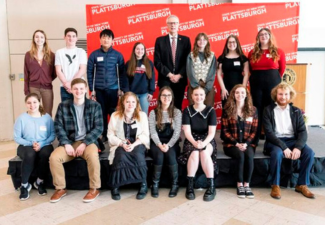N.Y. Supreme Court Justice Harriet Thompson '78 Draws on Plattsburgh Experience | SUNY Plattsburgh
There was no shortcut for Harriet Thompson ’78 to become an acting justice on the Kings County Supreme Court in Brooklyn, N.Y.
“I earned it the old fashioned way—hard work,” said Thompson, 60, adding that being both African American and a woman meant she had to work even harder to get to where she wanted to go.
Before she was promoted to her current position, which she started on the first day of 2016, she served for about six years as a New York City Civil Court judge for Kings and Queens counties.
New York State law specifies judges must retire by age 70, but Thompson doesn’t plan on stopping there. She wants to return to work as a lawyer after she leaves the bench.
“I enjoy the practice of law. (It’s) part of my DNA,” she said.
A Lasting Impression
Thompson chose SUNY Plattsburgh because of its location and affordability. In her career as an attorney and judge, she has found little correlation between the amount of money spent on higher education and a graduate’s future success.
“You don't always have to go to a private school ... to get a quality education,” Thompson said. “I got a quality education in the SUNY system.”
Being in Plattsburgh, away from the bustle of Long Island where she grew up “was more conducive to a study atmosphere,” she said. On campus, she double majored in history and political science.
The natural beauty of northern New York and the Adirondacks made a lasting impression on her.
“One of the things that I found to be really significant for me and my development as a student is the environment was beautiful,” she said. “Sometimes I would just sit and stare out the window. You can breathe clean air up there, too.”
Thompson’s son, John Shand, is preparing for his college years. SUNY Plattsburgh, she said, would be a great place for him to earn his degree.
“I’m going to encourage my son to apply.”
Well Prepared
Thompson was one of the founding members of AKEBA, SUNY Plattsburgh’s black student union.
“There was a cultural lack when I was there,” she said, noting the organization gave black students the support they needed and a voice in college policy-making.
Despite the absence of services for minority students at the time, she felt comfortable at Plattsburgh. And she worked hard, graduating with honors.
The variety of courses she took left her with the skills needed to succeed in a strenuous law school curriculum. She cited the ability to gain good writing and even better public speaking skills.
“I was well prepared for law school,” she said. “No doubt about it.”
Thompson graduated from Albany Law School in 1982. She worked in the Office of the Attorney General and as a private attorney at firms in Manhattan and Brooklyn. She also operated her own law firm for 17 years before she was elected judge in 2011.
‘Unmatched’ Work Ethic
Her current position is a hybrid post. She oversees civil cases, such as personal-injury, wrongful death, foreclosure and breach of contract matters.
“From the time my feet hit the building until the end of the day I do not stop working,” Thompson said. “I’ve always been a worker, a contributor. I’m there to serve.”
Her work ethic is unmatched, said Adina Herman, a young lawyer who has worked as Thompson’s court attorney for five years.
Much of what Herman knows about the practice of law she owes to Thompson’s guidance.
“She has taught me not only law and procedure, but just how to be an overall good person and serve your public, serve those in your community,” she said. “I would not have wanted to learn any of this from anyone else.”
Being a judge often requires acting as a kind of therapist to litigants. Herman said Thompson excels at that, taking time with each litigant who passes through her courtroom to make sure they understand the policies and procedures of the court and the status of the case.
“There are attorneys who come in all the time and say ‘this judge is remarkable and can you thank her for me,’” Herman said.
While Thompson’s job is a big part of her life, it doesn’t define her as a person.
Thompson is a devoted mother who loves to cook. She often brings in dishes to share with her colleagues.
To Herman, Thompson is not only a boss, “but she’s a mentor and she’s become a friend.”
“I am truly blessed to have been matched with her because I know that I learn a lot from her both personally and on the job,” she said.
Sacrifice for Success
Reflecting on her years in school, Thompson said students who maintain a balance of work and social activities will be best equipped to manage both life in college and later in the workforce.
“You have to learn how to work hard and when you’re able to play, play hard. But one can't outbalance the other,” she said.
Another characteristic critical for success, Thompson said, is the desire to make a difference and help others. It is a practice she has kept central in her life, standing for the “underdog.”
At one time, she worked for the New York State Division of Housing and Community Renewal, enforcing real estate law in cases against corrupt landlords.
“(I was) always trying to help out those that that didn't have the strength that I had or the abilities to say things and be bold in their speech.”
The fruits of labor, she notes, are all the more sweet when one has overcome obstacles to harvest them.
“To be able to make it against some odds,” she said. “It says a lot.”
Thompson is vice president of the Brooklyn chapter of the National Association of Women Judges; former treasurer of the Kings County Housing Court; former secretary of Judicial Friends, an association for people of color in the judiciary; member of the Brooklyn Bar Association; an inactive member of the women's bar association and a member of Mount Moriah AME Church in Queens.
News
Alumni Celebrated for Sustained Support of North Country, Residents
Knelly Named Special Adviser to SUNY for Clinton Transition

Sports Hall of Fame, Unity Day at the Pond Among Homecoming 2023 Highlights
SUNY Plattsburgh Grad Finalist at National Entrepreneurship Competition
